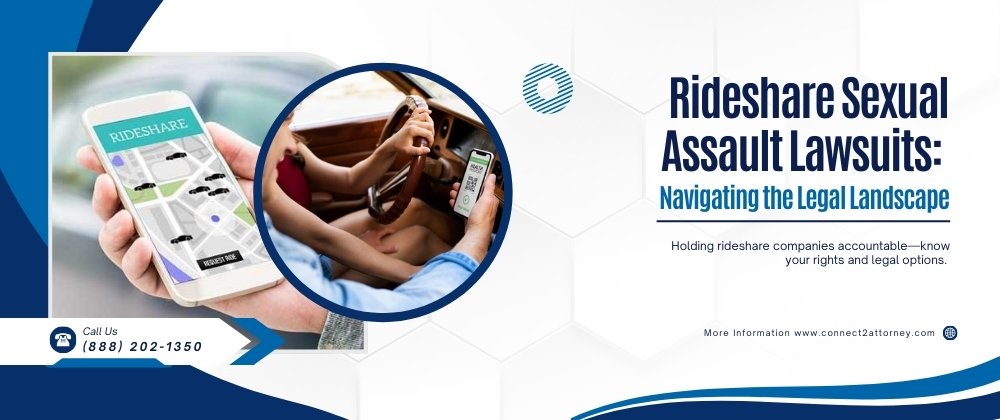Rideshare Sexual Assault Lawsuits: Navigating the Legal Landscape

Understanding Rideshare Sexual Assault Lawsuits
Ridesharing has transformed the way people travel, offering convenience at the tap of a button. However, the industry has also faced significant concerns regarding rider safety. Reports of sexual assaults linked to rideshare drivers have resulted in lawsuits against major rideshare companies, as victims seek justice for their traumatic experiences. As legal actions increase, understanding the rights of survivors and the evolving legal landscape is critical.
The Growing Crisis of Sexual Assault in Rideshare Services
According to Uber’s 2019-2020 U.S. Safety Report, nearly 3,824 sexual assault reports were recorded over two years. The issue extends beyond one company, as Lyft has faced similar claims, with lawsuits alleging negligence in preventing assaults. These numbers highlight the urgent need for better safety measures and accountability in the rideshare industry.
In January 2024, new lawsuits emerged against rideshare companies, accusing them of failing to implement adequate background checks and safety measures. Victims argue that companies have prioritized expansion over passenger safety, leading to preventable incidents. Legal actions continue to gain momentum, pushing for stricter regulations and increased transparency.
Legal Grounds for Filing a Rideshare Sexual Assault Lawsuit
Survivors of rideshare sexual assault can pursue legal action under various legal claims, including:
1. Negligence
Rideshare companies have a duty to protect passengers. If they fail to screen drivers properly, ignore previous misconduct reports, or lack adequate security measures, they may be held liable.
2. Failure to Warn
Many lawsuits allege that rideshare companies did not sufficiently warn passengers of the potential risks of using their services. Plaintiffs argue that clearer safety warnings and better emergency response systems could have prevented these incidents.
3. Vicarious Liability
Although drivers are classified as independent contractors, lawsuits challenge this classification, asserting that companies should be responsible for their drivers’ actions under vicarious liability laws.
4. Consumer Protection Violations
Some cases claim that rideshare companies misrepresent the safety of their services, violating consumer protection laws. Misleading safety assurances may give passengers a false sense of security.
Recent Case Update in Rideshare Assault Cases
February 2024: Lyft Agrees to $25 Million Settlement
Lyft agreed to settle a class-action lawsuit for $25 million after facing claims that the company failed to address repeated sexual assault reports. The lawsuit included hundreds of survivors who alleged negligence in handling complaints and driver vetting processes.
Steps to Take If You Are a Victim of Rideshare Sexual Assault
Survivors have legal options to pursue justice and compensation. Here’s what victims should do:
1. Report the Incident
Immediately report the assault to local law enforcement. A police report will be essential in building a legal case.
2. Seek Medical and Emotional Support
Medical professionals can document injuries and provide necessary care. Counseling and support groups can also help survivors process their trauma.
3. Preserve Evidence
Keep all records, including ride receipts, app screenshots, driver details, and any communication with the rideshare company. This information can be critical in proving the case.
4. Consult an Attorney
Legal experts can evaluate the claim and guide survivors through the lawsuit process. Many lawyers offer free consultations to discuss potential legal actions.
Compensation Available in Rideshare Sexual Assault Cases
Victims filing lawsuits may be eligible for various types of compensation, including:
• Medical expenses (hospital visits, therapy, medications)
• Lost wages (if unable to work due to trauma)
• Pain and suffering (emotional distress, PTSD, anxiety)
• Punitive damages (to hold companies accountable for negligence)
Rideshare Companies’ Response and Safety Measures
In response to growing legal pressure, rideshare companies have introduced new safety features, including:
• RideCheck technology: Detects unexpected route changes or prolonged stops.
• Emergency button in-app: Directly connects users to 911.
• Increased background checks: Continuous monitoring of driver records.
Despite these efforts, critics argue that the measures fall short and that companies must do more to protect passengers.
Holding Rideshare Companies Accountable
The surge in lawsuits and settlements indicates a shifting legal landscape where rideshare companies face heightened scrutiny. As more survivors come forward, legal precedents continue to evolve, paving the way for stronger consumer protections and increased corporate accountability.
Survivors deserve justice, and legal action plays a crucial role in bringing about meaningful change. Holding rideshare companies accountable is essential to ensuring safer transportation options for all passengers.
Need Legal Assistance? If you or someone you know has been a victim of rideshare sexual assault, legal support is available. Connect2Attorney specializes in helping survivors navigate their legal options and seek the justice they deserve. Contact us today to learn how we can assist you in taking the next steps toward healing and accountability.








